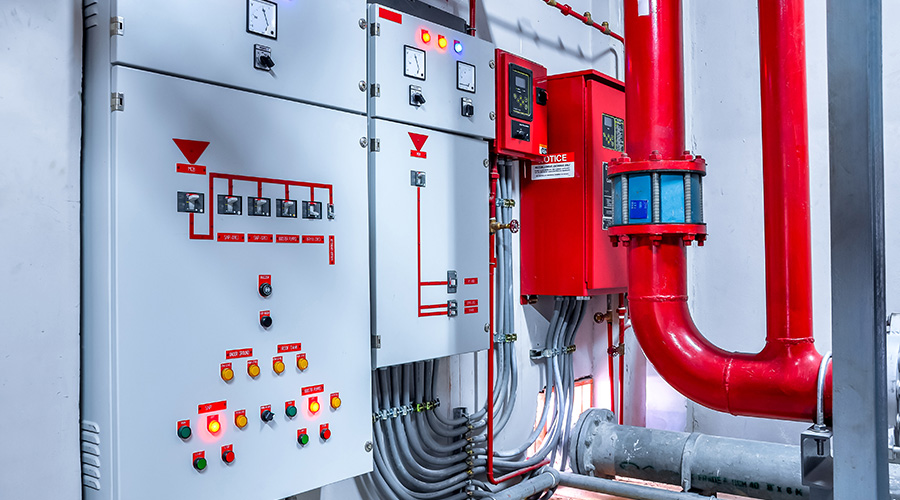
Get answers to how the National Fire Alarm and Signaling Code applies to your facility
NFPA 72 is the National Fire Alarm and Signaling Code and as stated in its scope: “NFPA 72 covers the application, installation, location, performance, inspection, testing, and maintenance of fire alarm systems, supervising station alarm systems, public emergency alarm reporting systems, fire and carbon monoxide detection and warning equipment, and emergency communications systems (ECS), and their components.”
Here are some answers to commonly asked questions regarding NFPA 72:
How does NFPA 72 apply to my facility?
NFPA 72 is an essential code for a facility manager to understand for all requirements related to fire alarm systems. Every facility’s installation, operation, inspection, testing, and maintenance of a fire alarm system is governed by NFPA 72.
The requirements for fire alarm system inspection, testing, and maintenance apply to all existing and new systems and all building owners are required to follow the requirements. This point is important: It is the building owner’s responsibility to ensure the fire alarm system is tested and maintained in accordance with NFPA 72. It is the facility manager’s responsibility to ensure that the building owner’s top management team is aware of this requirement (regardless of how active local enforcement of codes may be).
NFPA 72 is not a design manual; therefore, it does not dictate the type of system needed in a building. The system type or basic design requirements generally start with the building code as a minimum. Corporate requirements using corporate fire protection goals will expand the design to meet those goals. NFPA 72 does have very specific application and installation requirements.
Is NFPA 72 a building code, fire code, or an installation standard?
NFPA 72, although called a code, is actually an installation standard. It specifies locations and installation requirements for the various devices and appliances used in fire alarm systems.
In general terms, the building code has all the minimum requirements to be followed for the construction of a new building. There are requirements that apply to all new buildings regardless of the type of occupancy, and there are additional specific requirements that are spelled out for each occupancy. The building code will specify the type of fire alarm system (as a minimum) that is required in a specific occupancy. For example, all new K-12 educational occupancies require a voice fire alarm system. Building codes tend not to be retroactive (there are exceptions) and only apply to new construction. The building code is enforced by the building code enforcement group in each jurisdiction. This group may include, for example, the building, electrical, and plumbing inspectors for the jurisdiction.
The fire code is generally used by fire inspectors to ensure the continued life safety of the occupants in the occupied building. It contains information like the building code as well as information regarding hazardous materials storage and fire protection systems maintenance. The fire code is used and enforced by the jurisdiction fire inspectors (often the fire prevention officers).
NFPA 72 does not provide design guidance. A facility manager is encouraged to find a fire protection engineer to develop a design that meets both corporate goals and building code requirements. Using an installer to design a system is a risky course of action. The installer will likely not have any fire protection design background and often will make critical mistakes in the design.
How do I know what version of NFPA 72 applies to my facility?
There are two answers to this question.
The first answer applies to installation of the fire alarm system. If the system is for a new building, then the edition of NFPA 72 referenced by the building code in force at the time of construction is the edition that applies. For a new system installed in an existing building, the edition of NFPA 72 that is referenced by the building code at the time of system installation will prevail.
The second answer applies to the inspection, testing, and maintenance for the fire alarm system in your facility. Inspection, testing, and maintenance must be conducted in accordance with the latest edition of NFPA 72 adopted in the jurisdiction, regardless of when the fire alarm system was installed.
Wayne D. Moore is a licensed professional fire protection engineer with over 45 years of engineering experience. Moore currently serves on the NFPA 72 Correlating Committee and Chapter 24 Technical Committee (past Chair), as well as being an editor of five editions of the “National Fire Alarm Code Handbook.”
Larry D. Rietz, is a NICET Level IV Certified fire alarm designer with more than 29 years of life safety industry experience. Rietz is Vice President and Global Service Line Leader for Fire Detection and Alarm for Jensen Hughes and serves on the NFPA 72 Chapter 24 and 12, 21, & 23 Technical Committees.
Related Topics:
The post "NFPA 72: Commonly Asked Questions" appeared first on Building Operating & Management







0 Comments